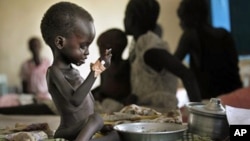The United Nations Children's Fund says it is preparing for a worst-case should conflict break out after next month's referendum on independence for Southern Sudan. UNICEF says it cannot predict what will happen, but it has to be ready to provide emergency care for hundreds of thousands of children who are among the most disadvantaged in the world.
Southern Sudan has been living in a state of relative stability since it signed a peace agreement with the north five years ago. This period of relative calm has created some opportunities for development, but not enough.
UNICEF describes the humanitarian situation there as terrible. Director of Southern Sudan Area Program, Yasmin Ali Haque, says aid agencies could be facing a humanitarian crisis as a consequence of the independence referendum in January.
She says the United Nations is working on a contingency plan to be prepared for any emergency.
"It does take into consideration that there is likely to be a resumption of conflict, in which case, there is likely to be population movements, there is going to be displacements, etc.," she said. "So, in terms of the preparedness, it is really looking at how UNICEF and other agencies would be meeting their commitments in a humanitarian crisis."
Haque says UNICEF's priority is the children of southern Sudan. She calls their situation desperate, and the statistics bear this out.
UNICEF reports for every 1,000 live births, 102 infants die.
Data show many children suffer from acute and chronic malnutrition, and southern Sudan has one of the lowest routine immunization rates in the world. More than 90 percent of the population lives on less than $1 per day. Most of the population has no access to good drinking water and most children in southern Sudan receive less than five years of primary school education.
As part of its preparations, Haque says UNICEF is putting in place a number of core services for children.
"How do we address the needs of children who are likely to be separated from their families, making sure that does not happen. Or, if it does, we have systems in place to trace the families and reunite the children with the families, especially looking at the various threats children do face in conflict situations. Whether it is recruitment by armed groups or whether the schools and health centers come under attack," she said. "Humanitarian access is another issue that we would be monitoring and advocating on."
Despite the fears, Haque says people are excited about next month's referendum. She says many people are returning from the north to the south so they can vote.
Haque says the whole issue is surrounded by a great deal of energy and enthusiasm. But she says the government, the people, and aid agencies agree they have to be prepared for whatever might happen.
UN Preparing for Worst Case Scenario in Southern Sudan




